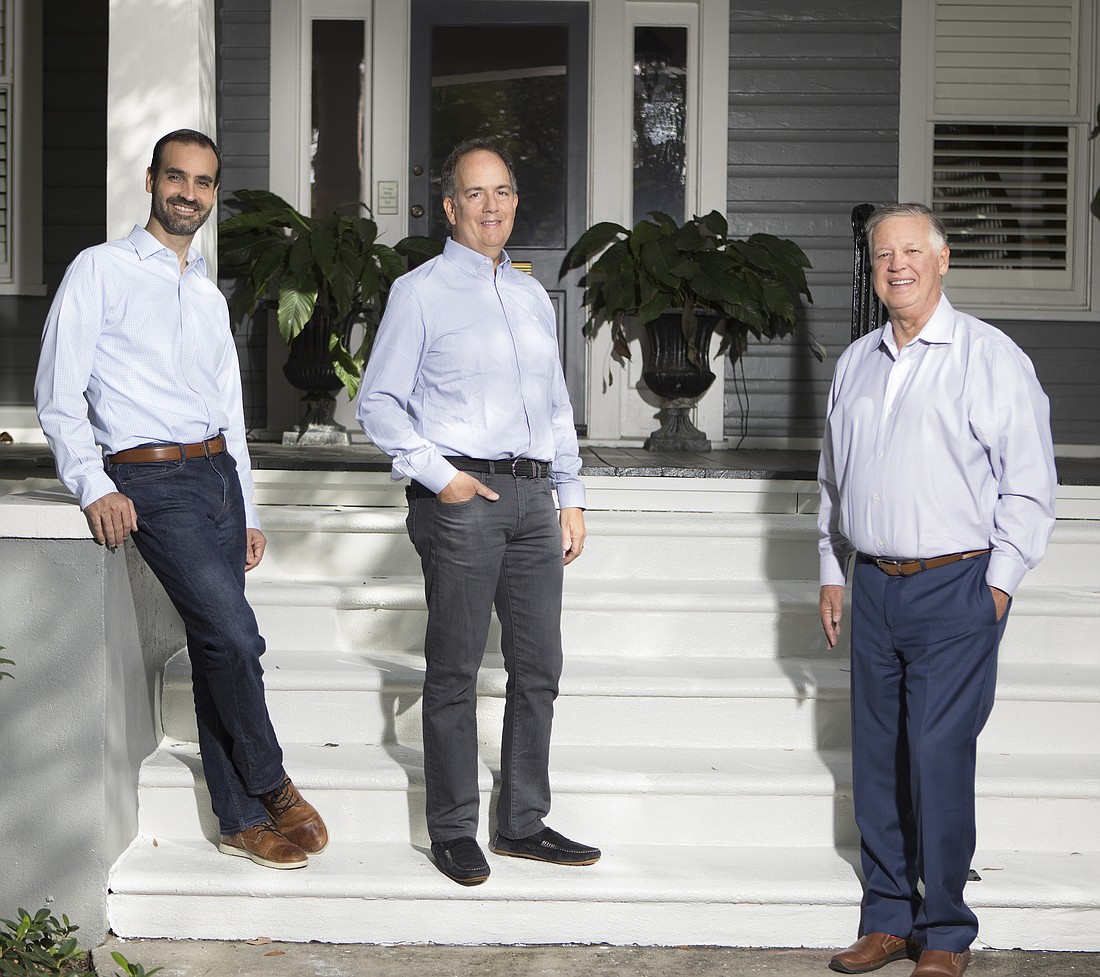- July 26, 2024
-
-
Loading

Loading

Twenty years is a long time to work for any company, let alone an investment firm that operates in the fast-paced world of growth capital, where entrepreneurial opportunities abound.
Yet Steve Lux, Travis Milks and Brian Model, the co-founders of Tampa-based Topmark Partners and a new growth equity fund, find themselves still working alongside one another two decades after they first joined forces as Stonehenge Growth Equity Partners. The triumvirate is special not only because of their longevity but also because of their age diversity. Lux, 63, is the elder statesman, Model is 54, and Milks is 42. “Travis was our first intern,” Lux says.
‘Recurring, repeatable income streams are important — there has to be a proven business model with good growth and a good customer base.’ Steve Lux, Topmark Partners principal
After earning a business degree from the University of Tampa, Milks worked at Stonehenge Growth Equity Partners — part of Stonehenge Capital Co., which has offices in Tampa, Dallas, Denver and New York City — until 2006, when he left to join the MBA program at Harvard Business School. Lux and Model thought they had seen the last of Milks, but, Harvard business degree in hand, he returned to Tampa, and they got the band back together.
As Topmark Partners, Lux, Model and Milks remain affiliated with Stonehenge Capital Co. And they've recently launched a new growth equity fund that aims to raise $75 million to invest in medical tech companies generating between $3 million and $30 million in gross annual revenue.
In their previous incarnation as Stonehenge Growth Equity, Lux, Model and Milks established a solid track record of picking winners. They handled the first institutional investment in Tampa-based Red Vector, an e-learning firm that would go on to become Vector Solutions, which grew to $36.6 million in annual revenue. Other successful investments include a pair of tech firms that specialize in data collection for clinical trials.
The timing of their latest move — during a pandemic that has ravaged the economy and created sky-high levels of uncertainty — raises some questions. Namely, what is the risk tolerance of the institutional investors targeted by Topmark? Will they be willing to take chances on companies that might not yet be profitable?
“We want all of the companies we invest in to be successful,” Lux says. “We are not looking for high flyers.”
That’s an important distinction and a key to understanding Topmark’s conservative, market-tested approach and why it’s appealing to institutional investors. For Lux, Model and Milks, throwing money at a bunch of unproven entrepreneurs in the hope one or two of them will pan out as lucrative investments, even if the majority of them fail, is not part of the playbook.
“First and foremost, we look at the management team,” Lux says. “Have they identified a pain point, a problem they can solve? And is there a large enough market [for their product or service]? Recurring, repeatable income streams are important — there has to be a proven business model with good growth and a good customer base. Our capital is just a means to accelerate revenues.”
Significant progress has been made in securing subscriptions for the new fund, which is about halfway to its $75 million goal, Lux says. No funds have yet been committed to companies, but Topmark is in the due diligence phase with a few, he adds.
There are both pros and cons to the timing of the trio’s new venture. Face-to-face meetings, for example, are the firm’s preferred way to gather crucial information it uses to make investment decisions. The pandemic has made such meetings difficult, much to Lux’s consternation.
“Are we comfortable with making investment decisions via Zoom calls?” he asks, cognizant times have changed, perhaps for good. “We will have to look at opportunities with management teams that we haven’t met personally, but we really like to ‘kick the tires.’”
Model, however, sees the upside of seeking out deals during the pandemic. He says some of the best investments the firm has made have come during economic downturns, such as 2000-01, when the dot-com bubble burst, and the recession of 2008-09. With a $75 million fund, the company looks to make investments of $2 million to $3 million.
“Companies that have good track records that are impacted by the pandemic could be a great opportunity to invest in,” Model says. “Also, just think about all the entrepreneurs who are on the sidelines. These types of market dislocations spur creativity.”